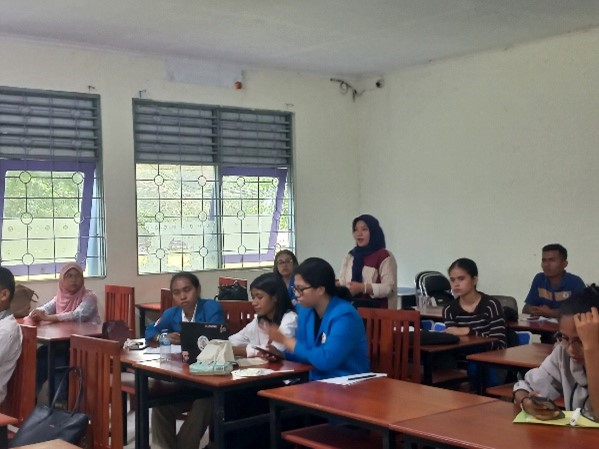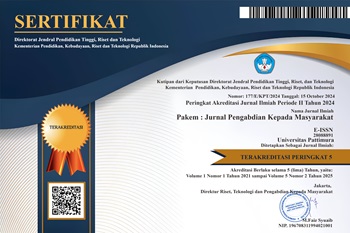OPTIMALISASI PERAN MAHASISWA PBSI DALAM PKM MELALUI SOSIALISASI DAN COACHING
Abstract
The low participation of students in the Student Creativity Program (PKM) is due to a lack of understanding and experience in proposal writing, even though PKM is a crucial platform for developing students' academic and non-academic potential. This community service program was initiated to enhance the capacity of students from the Indonesian Language and Literature Education Study Program (PBSI) at Universitas Pattimura to compete at the national PKM level. The method involved socialization, technical training, intensive mentoring, and proposal evaluation. Evaluation was based on active student participation in each stage and the quality of proposals produced, with success indicators including the number of groups formed, improved conceptual understanding, and proposal readiness according to national standards. The results showed a 100% increase in participation—from zero to four student groups submitting proposals, consisting of one PKM-AI group and three PKM-RSH groups. The quality of proposals also improved in terms of structure, originality, and feasibility. Sustainability strategies included establishing the PBSI PKM Community and involving alumni as active mentors. This program demonstrated that a structured training and mentoring approach can significantly enhance student preparedness in PKM competitions
Downloads

Copyright (c) 2025 PAKEM : Jurnal Pengabdian Kepada Masyarakat

This work is licensed under a Creative Commons Attribution-NonCommercial-ShareAlike 4.0 International License.
Authors who publish with PAKEM: Jurnal Pengabdian Kepada Masyarakat agree to the following terms:
- Authors grant copyright to the journal and right of first publication with the work simultaneously licensed under a Creative Commons Attribution License (CC BY-NC-SA 4.0)
- Authors are able to enter into separate, additional contractual arrangements for the non-exclusive distribution of the journal's published version of the work (e.g., post it to an institutional repository or publish it in a book), with an acknowledgment of its initial publication in this journal.
- Authors are permitted and encouraged to post their work online (e.g., in institutional repositories or on their website) prior to and during the submission process, as it can lead to productive exchanges, as well as earlier and greater citation of published work.

1.png)













